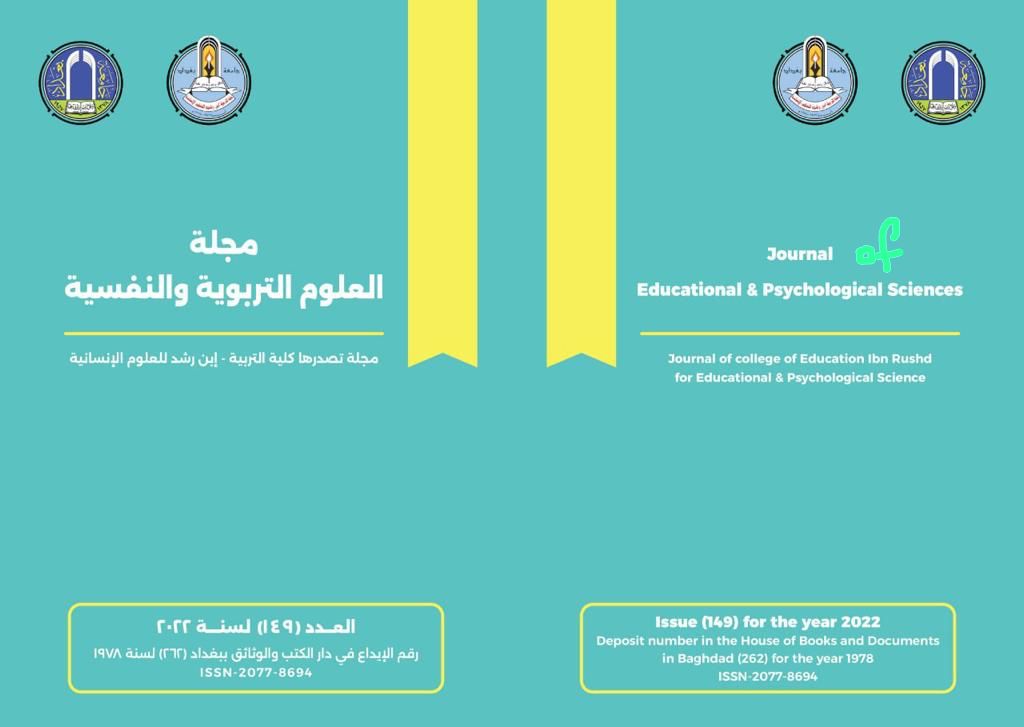Abstract
This study aimed to identify the viewpoints of educational experts in the Sultanate of Oman on the necessary standards to achieve the quality of evaluating student learning, and to examine the differences in the viewpoints according to gender, job role, and academic qualification. In order to achieve the objectives of the study, the descriptive research approach was employed, whereby a questionnaire consisting of (37) items was constructed according to a five-point scale and distributed into (6) dimensions: clarity of the purpose of the evaluation, the relationship of the evaluation with clear learning outcomes, a good design of the evaluation method, the participation of students in the evaluation process, fairness and objectivity of the evaluation, and diversity in the evaluation. The psychometric properties of the questionnaire were verified in terms of validity and reliability. The questionnaire was applied to a sample of (135) academics specialized in the field of teacher preparation in the College of Education at Sultan Qaboos University, supervisors of study subjects, and exams supervisors at the Ministry of Education in the Sultanate of Oman. The results of the study showed that the sample members believed in the importance of the availability of all standards (clarity of the purpose of evaluation, relationship of evaluation with clear learning outcomes, good design of the evaluation method, participation of students in the evaluation process, fairness and objectivity of evaluation, and diversity in evaluation) with a high degree to achieve the quality of evaluating student learning. The results also indicated that there were no statistically significant differences between the educational experts in the degree of importance of the availability of standards attributable to gender, job role, and academic qualification. The study concluded on the importance of making use of the list of standards when implementing the educational evaluation in the educational process and conducting more studies related to the quality of the educational evaluation
Keywords
educational evaluation
educational experts
quality of evaluation
standards
Sultanate of Oman
Abstract
هدفت هذه الدراسة إلى التعرف على وجهة نظر الخبراء التربويين في سلطنة عمان حول المعايير اللازمة لتحقيق جودة تقويم تعلم الطلبة، وفحص الفروق في وجهات النظر باختلاف الجنس والدور الوظيفي والمؤهل الدراسي. ولتحقيق أهداف الدراسة، تم توظيف المنهج الوصفي، حيث تم بناء استبانة مكونة من (37) فقرة وفق مقياس خماسي التدريج وموزعة على (6) أبعاد، هي: وضوح الغرض من التقويم، وارتباط التقويم بمخرجات واضحة للتعلم، والتصميم الجيد لطريقة التقويم، ومشاركة الطلبة في عملية التقويم، وعدالة التقويم وموضوعيته، والتنوع في التقويم. وقد تم التحقق من الخصائص السيكومترية للاستبانة من حيث الصدق والثبات. ثم تطبيق الاستبانة على عينة شملت (135) فردا من الأكاديميين المتخصصين في مجال إعداد المعلم بكلية التربية في جامعة السلطان قابوس، ومشرفي المواد الدراسية، ومشرفي الامتحانات بوزارة التربية والتعليم في سلطنة عمان. وقد بينت نتائج الدراسة أن أفراد العينة يعتقدون بأهمية توفر جميع المعايير المذكورة آنفا (وضوح الغرض من التقويم، وارتباط التقويم بمخرجات واضحة للتعلم، والتصميم الجيد لطريقة التقويم، ومشاركة الطلبة في عملية التقويم، وعدالة التقويم وموضوعيته، والتنوع في التقويم) بدرجة مرتفعة لتحقيق جودة تقويم تعلم الطلبة. كما أشارت النتائج إلى عدم وجود فروق ذات دلالة إحصائية بين الخبراء التربويين في درجة أهمية توفر المعايير تعزى إلى الجنس والدور الوظيفي والمؤهل الدراسي. وخلصت الدراسة إلى أهمية الاستفادة من قائمة المعايير التي تم التوصل إليها عند تنفيذ التقويم التربوي في العملية التعليمية، وإجراء المزيد من الدراسات ذات العلاقة بجودة التقويم التربوي.
Keywords
التقويم التربوي، جودة التقويم، المعايير، الخب
